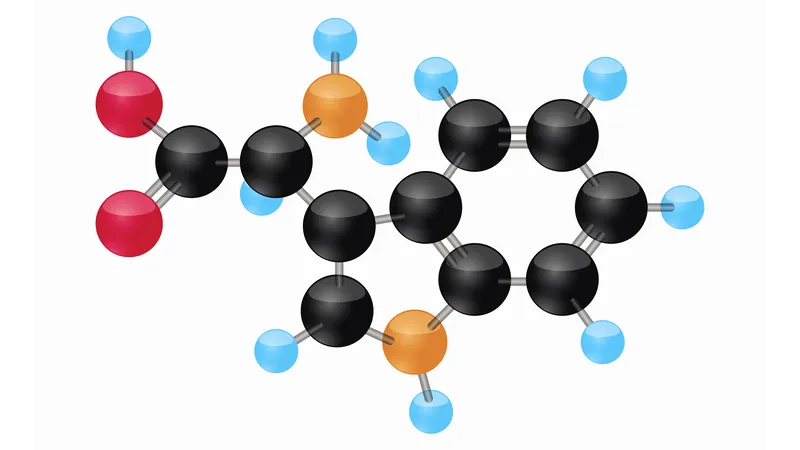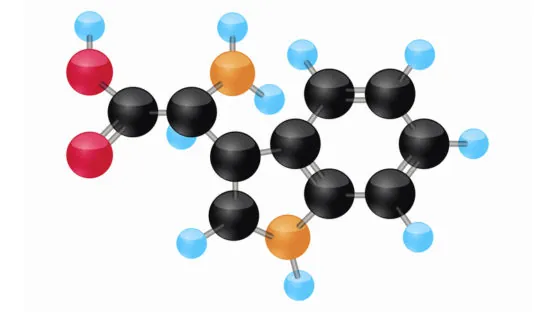A new open access paper takes a look at tryptophan and the role that it plays in the dysfunction of the immune system in the context of the age-related changes that occur in the microbiome [1].
The microbiome
The gut microbiome is a complex ecosystem of bacteria, archaea, eukarya, and viruses that live inside of us, some beneficial and some harmful, the balance of which keeps us alive. Four microbial phyla, Firmicutes, Bacteroides, Proteobacteria, and Actinobacteria, make up 98% of the total population of the intestinal microbiome.
It has taken years of research to start to unravel the complexities of the gut microbiome and how it interacts with our own cells and influences health and lifespan, but that work is starting to bear fruit as our understanding grows.
Many of these teeming bacteria produce useful compounds, such as butyrate, propionate, and indole, that our bodies rely on in order to function. Unfortunately, as we age, the relevant populations of bacteria typically decline along with their beneficial compounds, which can have a significant impact on health.
Tryptophan and the kynurenine pathway
Tryptophan is an α-amino acid that is used in the production of proteins. It is essential in humans: the human body cannot create it, so it must be obtained from dietary sources and processed by the bacteria in the microbiome. Like other compounds, the availability of tryptophan falls as we grow older due to changes to the populations of bacteria that produce it [2].
Generally, the age-related decline of beneficial gut bacteria producing such compounds as tryptophan is accompanied by increasing numbers of harmful bacteria, which contribute to the rise of chronic inflammation typically seen in older people. This smoldering background of persistent low-grade inflammation is known as inflammaging, and it plays havoc with the immune system, cell signaling, and tissue repair, facilitating the development and progression of various age-related diseases.
Nicotinamide adenine dinucleotide (NAD+) is essential for DNA repair, cell signaling, and many other core cellular functions essential to life. This critical coenzyme can be created from scratch (“de novo”) using tryptophan via the kynurenine pathway, which is the only non-vitamin B3 way of creating NAD+. Therefore, the bacteria that produce tryptophan can compensate for shortfalls from dietary sources using this method; if those bacteria decline, then so does that safety net.
In this new paper, the researchers explore how tryptophan creation via the kynurenine pathway regulates inflammaging and supports long-term immune function along with how its levels change during aging and the progression of age-related diseases. Furthermore, they also take a look at how the kynurenine pathway influences other metabolic pathways, including NAD+, microbiota-derived indoles, and the metabolites produced by activation of the kynurenine pathway.
Finally, they also consider the ratio of tryptophan/kynurenine as a potential biomarker of inflammaging and discuss how intervention on the kynurenine pathway may be a therapeutic target to reduce chronic inflammation.
Inflammation aims to restore tissue homeostasis after injury or infection. Age-related decline of tissue homeostasis causes a physiological low-grade chronic inflammatory phenotype known as inflammaging that is involved in many age-related diseases. Activation of tryptophan (Trp) metabolism along the kynurenine (Kyn) pathway prevents hyperinflammation and induces long-term immune tolerance. Systemic Trp and Kyn levels change upon aging and in age-related diseases. Moreover, modulation of Trp metabolism can either aggravate or prevent inflammaging-related diseases. In this review, we discuss how age-related Kyn/Trp activation is necessary to control inflammaging and alters the functioning of other metabolic paths of Trp including Kyn metabolites, microbiota-derived indoles and nicotinamide adenine dinucleotide (NAD+). We explore the potential of the Kyn/Trp ratio as a biomarker of inflammaging and discuss how intervening in Trp metabolism might extend health- and lifespan.
Conclusion
The idea that the microbiome might be manipulated in order to promote health and potentially longevity is an interesting one, and there are multiple potential ways in which tryptophan levels in particular might be increased. The direct delivery of tryptophan is plausible, provided it can get beyond the gut and liver to reach the target cells.
Fecal transplants or probiotics are also a possibility in order to increase the population of bacteria that produce tryptophan and are probably a better long-term solution than repeatedly taking a supplement, which is only compensatory. That said, there is some positive animal data for butyrate supplements that offset changes to the gut microbiome, so both approaches are worth exploring.
Literature
[1] Sorgdrager, F. J., Naudé, P., Kema, I., Nollen, E., & De Deyn, P. P. (2019). Tryptophan Metabolism in Inflammaging: From Biomarker to Therapeutic Target. Frontiers in immunology, 10, 2565.
[2] Ruiz‐Ruiz, S., Sanchez‐Carrillo, S., Ciordia, S., Mena, M. C., Méndez‐García, C., Rojo, D., … & Ferrer, M. (2019). Functional microbiome deficits associated with ageing: Chronological age threshold. Aging cell.




